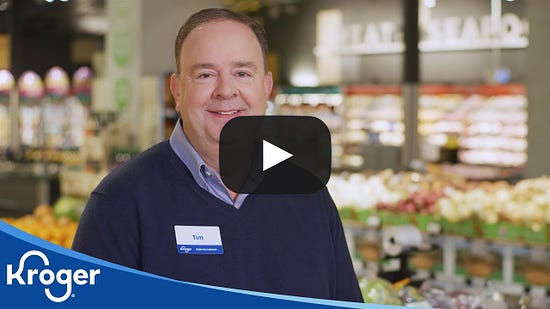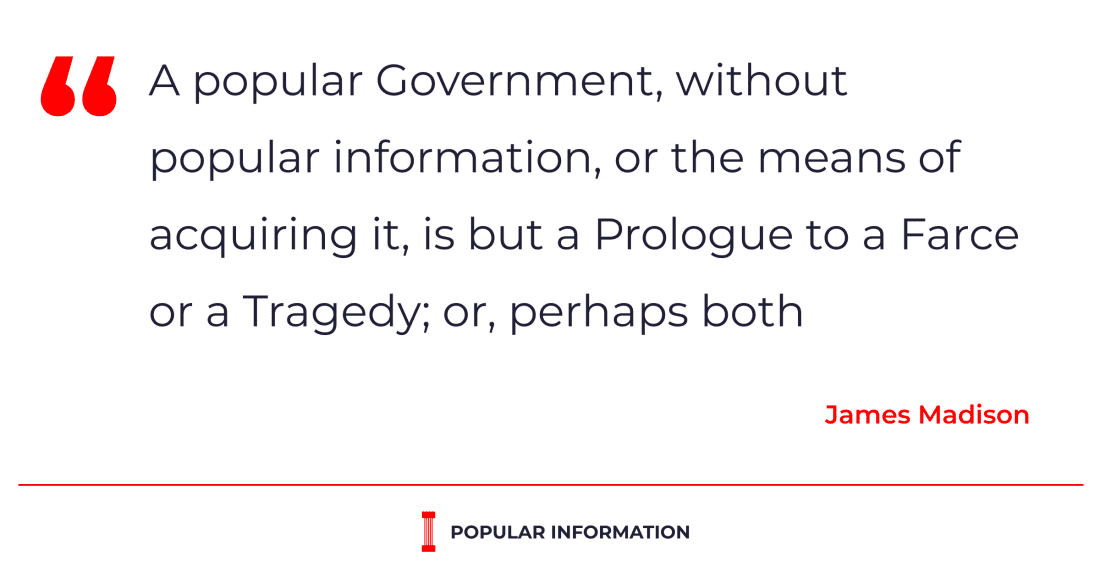On March 31, Kroger, the nation's largest supermarket chain, announced it would raise pay by $2 per hour for "all hourly frontline grocery, supply chain, manufacturing, pharmacy and call center associates." The company called this increase a "hero bonus." Kroger said the $2 increase was warranted because its hourly employees were "working tirelessly on the frontlines to ensure everyone has access to affordable, fresh food and essentials during this national emergency." It was a recognition, the company said, that "this crisis is far from over."

"We will continue to support you, and your families, during this difficult time. We care about your physical, your financial, and importantly, your emotional well-being — as we continue to improve our safety measures, and benefits, to support you," Kroger Senior Vice President Tim Massa said in a video about the pay increase.
Since Kroger's announcement, more than 75,000 people in the United States have died. Three times in the last week, daily fatalities in the United States have exceeded 2,000 people.
Among the dead are Kroger employees. On April 11, "Kroger sent out a statement that four Kroger employees at different locations in metro Detroit had died." Across the country, dozens of grocery store workers have died, and thousands have tested positive.
Now, as workers continue to put their lives on the line, Kroger has told its workers that their "hero pay" will end this Sunday, May 17. A Kroger employee in Oregon shared their thoughts on the decision with Popular Information:
We're all pretty mad. How can you mandate we all wear masks but reduce our pay? I have to have my temperature checked every morning but they're going to reduce our pay? We're making this company crazy money right now and they acknowledged what were doing is dangerous but they're still going to reduce our pay? Doesn't make sense.
Kroger defended the decision in a statement to Popular Information. "The temporary Hero Bonus is scheduled to end in mid-May. In the coming months, we know that our associates’ needs will continue to evolve and change as we all work together to gradually and safely reopen the economy," Keith Dailey, Kroger’s group vice president of corporate affairs, said.
Kroger spends hundreds of thousands on TV ads "thanking" its associates
As Kroger quietly phases out its pay increase for associates, it continues to run a national TV ad "thanking" its associates.
To our Kroger Associates:
For the long hours and late nights.
For the miles traveled and the shelves restocked.
For making a difference in our customers' lives.
For doing so much more than your job.
Everyone at the Kroger family of brands and our customers say, "Thank you."
In a time when daily live feels a bit uncertain, your hard work is keeping America fed.
According to an estimate by iSpotTV, Kroger has spent about $340,000 to air the ad. It ran yesterday on the national broadcast of Fox News Sunday.
Kroger's $12 million man
 |
In a Youtube video posted last Thursday, Kroger CEO Rodney McMullen expresses empathy for the pressures imposed on Kroger's workforce. "Tough times like these can cause increased anxiety and stress. For our associates, we have services available… And you can also help by being kind to each other. You may not know what someone else is going through. But kindness and a smile are easy to give, even when you have a mask on." McMullen said.
As CEO, however, McMullen is paid not in kindness but is cash, stock, and options. In 2018, the most recent data available, McMullen received total compensation of $12,037,872. According to the company's SEC filing, the median Kroger employee was paid $24,912. That means the ratio of McMullen's pay to the average employee was 483 to 1.
Although the details of McMullen's 2020 compensation plan are not yet available, much of it is "performance-based." In prior years, one of McMullen's performance metrics was "Reduction in Operating Cost as a Percentage of Sales, without fuel." So by ending the "hero bonus" for hourly employees, McMullen may be increasing his own salary.
Popular Information is hiring a paid summer intern. You can find more details about the internship and the application here.
With most businesses closed, Kroger's business is booming
Restaurants and many other businesses remain closed, providing a boost for supermarkets like Kroger.
In an April 1 press release, the company said that "the COVID-19 pandemic triggered a significantly greater lift in sales across both physical retail stores and digital channels in March." Sales during March increased by 30% over the previous year, and "demand has been broad-based across grocery and fresh departments." Kroger "expects first quarter identical sales...to be better than the annual growth rate provided in guidance for full year 2020."
The company says some of the sales lift may reflect permanent changes, "long-term shift in customer behavior toward eating more food at home."
Kroger tells Popular Information that it has spent "more than $700 million dollars to reward associates and safeguard our associates and customers during the pandemic." This framing conflates wages paid to associates with improvements that are made to physical stores. But to put this figure in perspective, the company has spent $755 million buying its own stock since November 2019.
Kroger also currently maintains "approximately $2.3 billion" in cash and "temporary cash investments." In other words, Kroger could certainly afford to continue paying its hourly workers an additional $2 per hour.
Corporate employees stay safe at home
While hourly employees will soon be paid their standard salary, as if conditions have returned to normal, thousands of Kroger's corporate employees will continue to work safely from home. "We have found that they can effectively serve and support our store teams while working remotely," Dailey told Popular Information.
Kroger's headquarters are in Cincinnati, and Dailey notes that "Ohio Gov. DeWine mandated office closures in Ohio in March." But DeWine's order was a result of the increased danger from working in close proximity to others. That same danger was the justification for Kroger extending "hero pay" to its workers. And that danger has not abated.
The company would not provide the number of its store employees who have been infected or quarantined. Dailey said that "Kroger’s case rate [is] below that of the surrounding communities where we operate, and significantly below the national case rate." Dailey did acknowledge that "all Americans remain at risk of contracting coronavirus."
The union pushes back
Many, but not all, of Kroger's stores are unionized by the UCFW. The UCFW locals representing Kroger workers in Kentucky, Ohio, Michigan, and Indiana wrote McMullen a letter objecting to the rescission of "hero pay."
This is no time for the Company to turn its back on the very people who've gotten Kroger through this pandemic thus far with no end in sight. We ask that you continue the Hero Pay, as your competitors have done, through the month of May, with an open mind that Hero Pay must continue as long as COVID-19 threatens the health and safety of our members and the communities they serve.
The union claimed that Kroger is not enforcing "social distancing" or "customer limits" in stores. It also criticized Kroger for not requiring its customers to wear masks in locations where it is not required by law.
Popular Information exists because of readers like you. Support relentless accountability journalism with a paid subscription.
Thanks for reading!
 |

